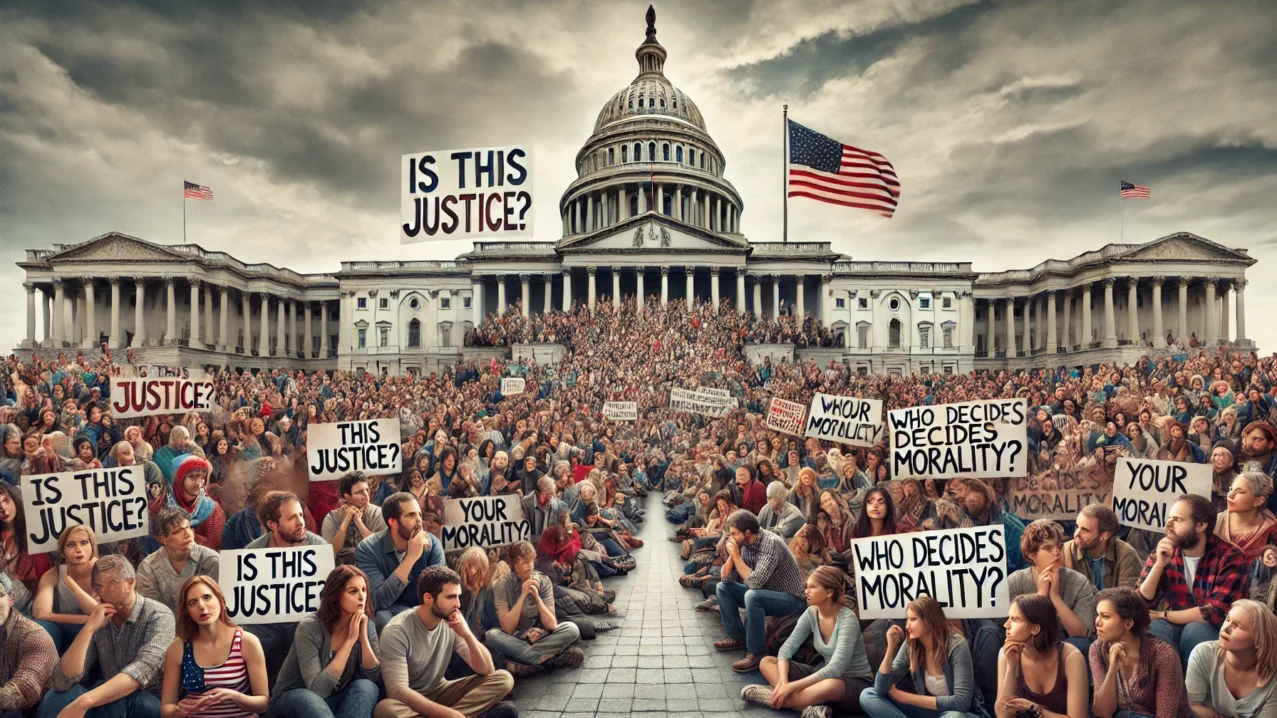I don’t have any problem with legislating morality. Would that all our laws were moral instead of about advantages for privileged and powerful groups! But rereading C. S. Lewis, I was reminded that the problem isn’t legislating morality. It’s legislating morality that people don’t think is morality.
In the decades of the Nineties and Aughts, I was quite active in socially conservative politics. I do not apologize for this. However, I had overlooked a couple of passages in C. S. Lewis that I actually knew!
In the title essay of God in the Dock, also called “God in the Dock,” he continues:
The ancient man approached God [or even the gods] as the accused person approaches his judge. For the modern man the roles are reversed. He is the judge: God is in the dock. If God should have a reasonable defence for being the god who permits war, poverty, and disease, he is ready to listen to it. The trial may even end in God’s acquittal. But the important thing is that Man is on the Bench and God in the Dock.
It is generally useless to try to combat this attitude, as older preachers did, by dwelling on sins like drunkenness and unchastity. The modern Proletariat is not drunken.
As for fornication, contraceptives have made a profound difference. As long as this sin might socially ruin a girl by making her the mother of a bastard, most men recognised the sin against charity which it involved, and their consciences were often troubled by it. Now that it need have no such consequences, it is not, I think, generally felt to be a sin at all. My own experience suggests that if we can awake the conscience of our hearers at all, we must do so in quite different directions. We must talk of conceit, spite, jealousy, cowardice, meanness, etc. But I am very far from believing that I have found the solution to this problem.
The Lewis essay is about evangelization and apologetics, not politics. But it has political implications too. The idea that we can avoid ‘legislating morality’ is absurd; if we were to strip all elements of morality from our legislation, all that would be left is crony capitalism upheld by the government and tax benefits for the influential. But the problem is, as I said, not ‘legislating morality’ as such, but legislating morality that large numbers of people don’t think is morality! I wonder what I would have done differently. Of course, in most cases, my activism was about supporting democratic decision making over very tendentious interpretations of Constitutional amendments that would have shocked those who drafted them.
Let us take the Twenty-First Amendment to the United States Constitution as an example. It reads in part:
- The eighteenth article of amendment to the Constitution of the United States is hereby repealed.
- The transportation or importation into any State, Territory, or possession of the United States for delivery or use therein of intoxicating liquors, in violation of the laws thereof, is hereby prohibited.
- [Provides that this amendment must be ratified by conventions, not legislatures, and within seven years.]
Prohibition was an example of trying to legislate morality that a lot of people didn’t think was morality at all! However, it is important to know that alcohol really was a severe social problem in 19th and early 20th century America. And it had to be dealt with in some way. So the issue was returned to the states. Note section 2. It was not a question of ‘bodily autonomy’ or of a ‘right’ of access to alcohol. State and local laws on the subject were specifically upheld. Meanwhile, today, a lot of people don’t believe ‘consensual’ fornication – including the same sex versions – is wrong. So we can legalize it without making it into some kind of a ‘right’.
I find it slightly amusing that so many people think government should not legislate what goes on in the ‘bedroom’, when there are so many regulations about building that bedroom in the first place!
You have to have a ‘building permit’, where your neighbors can opine on the effect of that bedroom on them; the process is supervised by the government. Meanwhile, you have to have a ‘certificate of occupancy’ to use the bedroom for any and all nefarious purposes, and if the house deteriorates to the point that the government considers it ‘uninhabitable’, you can be forced out.
So there is no ‘autonomy of property’. While property rights are not absolute, they proceed ultimately from God and not from the state or ‘society’, although the state and ‘society’ do have some influence. After all, there would have been no command “Thou shalt not steal” if respect for property were not a value.
A different approach, common in our culture, is the ‘health’ approach, sometimes called the ‘tobacco’ approach. This has been pretty successful against cigarettes, and the number of cigarette smokers has been greatly diminished. Meanwhile, the fact that indoor smoking has been curtailed, especially where food is being served and eaten, is a great blessing. I think trying to take that public approach to things like premarital cohabitation is best. Marriages without premarital cohabitation are less likely to end in divorce, and the state and the private sector may freely promote this fact publicly, as they do with the evils of tobacco. The same approach should be taken regarding sexually-transmitted diseases; other than condoms, most contraceptives do not protect against these.
Another victory not won by the Religious Right was the one exemplified by Mothers Against Drunk Driving, which has made us all the more careful about driving home after imbibing. Other practices, like premarital cohabitation, which make subsequent marriages less likely to last, can be discouraged by publicity about that fact.
I have my own concerns about the ‘safetyism’ problem. I am dealing with it because I’m promoting leashes over life jackets for standup paddleboarders. [See freesup.org for more information on this.] Yet ‘health and safety’ is useful in our culture for raising problems that the public doesn’t see as ‘moral’. As for me, if the public does see something as ‘moral’, I have no hesitation approaching the issue from that angle.
I should make a few specific comments about the hottest issue, abortion. Abortion is not a sexual act, but the taking of a human life, and few indeed get sexual pleasure, or any kind of pleasure, from it. It may be that the medievals thought human life and the imago Dei entered the unborn baby at the time of ‘quickening’, when the baby starts kicking, and it may be the case that the majority of the public holds this view. And it is also true that orthodox Protestants came around to the Catholic view a bit late – not until Francis and Frank Schaeffer started dealing with the issue in their writings and videos about 1979, six years after Roe vs Wade. It is also true that I have some sympathy for exceptions like the cases of rape and incest, where the woman was denied ‘choice’ when she should have had ‘choice’. And I don’t like to see women and doctors fearing going to jail for miscarriages! But I must admit that I think if someone openly advocates for abortion ‘rights’ it would be proper for the church to discipline them.
Euthanasia is linked to abortion by our historic Christian concern and reverence for life. The immorality of chosen suicide has been our tradition for a long time. And the right course for people with fatal diseases is not expensive, extraordinary measures to prolong life on the one hand, and not artificial means to shorten it on the other. And food and water are not a ‘medical treatment’, even if the only way I can receive them is by tube. Of course, it may have been our tradition, but it may also not be the moral belief of most people today. If euthanasia is imposed, I just hope it is done democratically rather than by some judge with a tendentious interpretation of the Constitution.
These are the critical life and death issues. Even with these, the public view may have drifted so far from moral orthodoxy that we should look for other sins to preach on when we seek to evangelize. As I said in my post “Bringing Back the Great Commission?,” our culture is actually quite concerned with sin right now, even if their idea of ‘sin’ doesn’t include some of the things we would like it to include!



